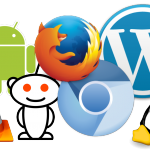Open Source Software Went Nuclear This Year

Open source software—software freely shared with the world at large—is an old idea. A guy named Richard Stallman started preaching the gospel in the early ’80s, though he called it free software. Linus Torvalds started work on Linux, the enormously successful open source operating system, in 1991, and today, it drives our daily lives—literally. The Android operating system that runs so many Google phones is based on Linux. When you open a phone app like Twitter or Facebook and pull down all those tweets and status updates, you’re tapping into massive computer data centers filled with hundreds of Linux machines. Linux is the foundation of the Internet.
If there's one thing we learned in 2015, it's that we shouldn't underestimate the power of open source.
And yet 2015 was the year open source software gained new significance, thanks to Apple and Google and Elon Musk. Now more than ever, even the most powerful tech companies and entrepreneurs are freely sharing the code underlying their latest technologies. They recognize this will accelerate not only the progress of technology as a whole, but their own progress as well. It’s altruism with self-interest. And it’s how the tech world now works.
“This is not just a turning point, but a tipping point,” says Brandon Keepers, the head of open source at GitHub, the online service that sits at the heart of the open source universe.
Apple Opens Up
This year, Apple open sourced the Swift programming language—a big departure from how it operated before. For the most part, Apple kept the code underpinning its previous language, Objective-C, to itself, ensuring that it ran only on Apple devices. By open sourcing Swift, Apple ensures the language can run on any device, including machines based on Linux, Android, and Microsoft Windows.
Yes, Apple is allowing its language to run on competing devices. But this is what it must do. Thanks in large part to the proliferation of open source software, the modern world no longer runs on a single computing platform the way it did in the ’90s, following the rise of Microsoft Windows. If Apple wants to keep pace, it must ensure that its coding tools run everywhere. That’s because the world’s software developers must build for all the platforms people around the world use. If Apple’s tools only work for Apple’s platform, developers will be less likely to use them.
Not convinced? Late in 2014, Microsoft came to the same conclusion when it open sourced .NET. For years, .NET was merely a way of building software that ran on Windows. Now that it’s open source, the wider software community can ensure that software built with Microsoft’s tools runs on Linux and Apple’s operating system, too.
Open Sourcing Intelligence
This also was the year Google open sourced TensorFlow, the software engine that drives its artificial intelligence services, including its image and speech recognition and language translation tools. Over the past 15 years, Google has built a wide range of data center technologies that have helped make it the most powerful company on the ‘net. These technologies allow all of the company’s online services to instantly handle requests from billions of people, no matter where in the world they may be. Typically, Google kept these technologies to itself, forcing others to engineer inferior imitations. With TensorFlow, Google has changed direction, freely sharing a creation that sits at the heart of its empire.
Why? Google realizes how important AI is to its future, and it knows that it can accelerate the progress of AI if it shares its software. Google employs many of the world’s smartest minds. But not all of them. Those beyond Google can help improve TensorFlow—improvements that Google can take advantage of. What’s more, it provides a means of identifying new talent. In a way, open sourcing TensorFlow helps the company train the smartest researchers for a career at Google.
Certainly, Google isn’t giving away all its secrets. It’s keeping parts of TensorFlow to itself. And its not sharing the mountains of data that are so essential to training its AI services. But it is sharing enough code to make a difference—both for others and for itself.
Elon for Everyone
Elon Musk went even further. In mid-December, he and Sam Altman, president of Y Combinator, unveiled OpenAI, a $1 billion nonprofit dedicated to the same breed of AI that Google is developing. They even snagged one of Google’s top researchers, Ilya Sutskever. And they’ve vowed to open source all their work. The idea is that by sharing the latest AI tech with everyone, they can ensure that no one AI operation becomes too powerful. That may sound counterinuitive. And we’re a long way from seeing how this plays out. But if there’s one thing we learned in 2015, it’s that we shouldn’t underestimate the power of open source.
Correction: This story originally said that Apple’s iOS is based on Linux. It is not.
